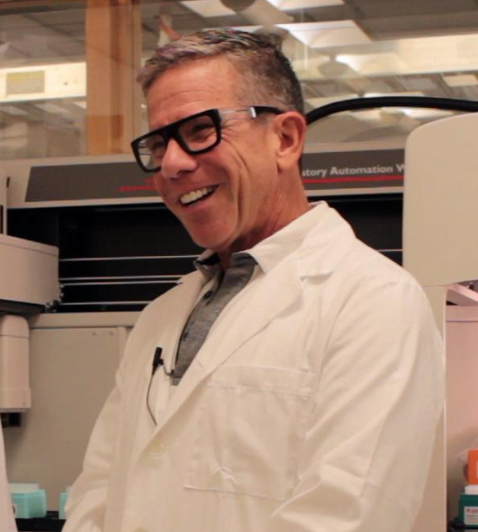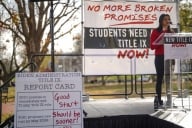You have /5 articles left.
Sign up for a free account or log in.

Michael Katze
University of Washington
The University of Washington, for the first time ever, has fired a faculty member over findings of sexual harassment. The termination surprised some not only for the what, but also for the who: Michael Katze, a professor of microbiology. Well funded and a major player in infectious disease research, Katze appeared to some as exactly the kind of professor who might have been protected by his (or any) institution in the past.
Also this month, Christian Ott, a professor of theoretical astrophysics at California Institute of Technology, resigned following a drawn-out suspension over the university’s finding that he sexually harassed two graduate students.
Professors on two other campuses have left this summer over allegations of sexual misconduct: Jason Fruth, an assistant professor of education, resigned from Wright State University during an investigation into claims against him, while the University of Nebraska at Lincoln ended the visiting professorship of photojournalist Bill Frakes.
The departures could be a mere coincidence of timing. But they could also be a sign that even big-name institutions are holding their big-name scholars to a higher standard of conduct.
Brett Sokolow, president and CEO of the NCHERM Group, a campus safety consultancy, and executive director of the Association of Title IX Administrators, said it’s not that campuses are now speedier to discipline faculty members found to have harassed students or others. That process still tends to be "painfully slow," he said. Rather, some campuses are now more "willing" to terminate faculty members for harassment.
The reason, Sokolow said, “is that more and more campus mind-sets have shifted, and the culture is shifting as a result from one of permissiveness [or] privilege -- or looking the other way -- to what is more like a zero-tolerance mind-set.”
It's simply too costly, in terms of public relations and crisis management, to try to "shield faculty anymore," he said, "and campuses are finally figuring that out.”
Negative Publicity
Indeed, negative publicity was a major factor in both Katze’s and Ott’s cases: they were the subjects of separate, lengthy stories on BuzzFeed ahead of their departures. Katze actually sued BuzzFeed and the university, to prevent the release of investigation details. (That was his second suit against Washington; another unsuccessfully alleged violations of due process related to his suspension from campus.) The effort failed, and BuzzFeed went ahead with its story -- backed by university documents -- on how Katze sexually harassed two female lab employees and misused university funds.
Specifically, Katze was found to have paid a lab administrator an unusually high salary in exchange for sexual favors. He allegedly harassed another lab worker by making sexual comments and trying to kiss or touch her while he was drunk, and by asking her to email escorts and place personal ads, buy drugs, clean his apartment and schedule his spa services. The university received prior complaints about Katze’s behavior.
Katze has not commented publicly on his case, and an attempt to reach him through his former attorney this week was unsuccessful. He in his lawsuits denied allegations of misconduct and said that a lab employee filed the most recent claim against him just days after he expressed concern about her job performance.
Katze reportedly told Washington’s investigator, "My job is to get grants. I am singularly focused on training scientists. This kind of shit is completely unimportant to me."
The sentiment might have been sincere. But in light of recent events, it recalls, at the very least, an antiquated way of thinking about faculty responsibilities.
Victor Balta, a spokesperson for the University of Washington, said Katze’s termination was the result of a faculty disciplinary process that confirmed “violations of university policies and executive orders, including conduct counter to the core values of our university.” Specifically, Katze was found to have violated campus policies related to sexual harassment, conflict of interest, use of resources and professional conduct, along with state ethics laws.
The decision to terminate any employee is one Washington takes “extraordinarily seriously,” Balta added via email. “The investigation and adjudication process is designed to ensure thorough consideration before a conclusion is reached.”
Ott, meanwhile, was found to have become infatuated with one of his graduate students and then to have fired her because of his feelings, according to documents first obtained by BuzzFeed. He also repeatedly discussed the matter with a second student. Ott was first placed on a nine-month leave and assigned extra training and supervision, but students and faculty members complained about what they perceived as a slap on the wrist for Ott possibly derailing a student’s career over romantic entanglements. His leave was extended after he was found to have contacted one of the students involved in his case, and he eventually resigned. The move is effective in December, but he won’t be back on campus between now and then.
Ott didn’t respond to a request for comment about his departure, but he’s previously challenged the notion that he “fired” the student in question.
Caltech didn’t provide comment as to how many professors it’s terminated over harassment. A spokesperson referred requests for comment to an earlier statement saying that Ott resigned after hearing that a faculty committee found he’d made “significant progress” toward his rehabilitative goals but remained “a divisive element on campus.”
Jason Fruth, at Wright State, resigned earlier this summer, following accusations that he raped a graduate student who worked for him and harassed others, according to the Dayton Daily News. A related criminal investigation did not result in charges; Fruth denied the claims but left his faculty position two weeks before a months-long university investigation was completed. Wright State documents first obtained by the Dayton Daily News say the investigation turned up 29 allegations of inappropriate behavior, such as Fruth sending students messages and photos of himself shirtless, telling them they were attractive and making sexual jokes. The university found that he’d violated campus policies by having sex with someone unable to give consent due to intoxication and engaging in a sexual relationship with a student whose work he supervised.
At Nebraska-Lincoln, the university confirmed that Bill Frakes’s appointment was cut short but did not provide details on the sexual harassment claims against him. Frakes told the Lincoln Journal-Star that those accused of violations of Title IX of the Education Amendments of 1972, which prohibit sexual harassment or gender bias in education, are entitled to a hearing. "The university has directed that the process be confidential and I intend to honor that request,” he said.
More Attention to Title IX and Harassment
Erin Buzuvis, a professor of law at Western New England University and moderator of the Title IX Blog, said it’s clear, in general, that institutions “are paying more attention to their responsibilities under Title IX to address sexual harassment.” Real evidence of that shift would include institutional changes to sexual harassment policies applicable to faculty members, and whether such policies played a role in faculty members’ terminations, she said.
In one major example, the University of California System has recently strengthened its policies and procedures regarding faculty misconduct; sexual harassment and assault, for example, are now explicit violations of faculty responsibilities. Those changes came after a group of scandals, including the Berkeley campus’s nonfiring of astronomer Geoff Marcy, who was found to have harassed multiple female graduate students (he eventually resigned, in 2015). The Los Angeles campus, in another example, settled with two graduate students who sued over its handling of a sexual harassment case against Gabriel Piterberg, a professor of history. He’s still teaching, after a short suspension and other sanctions, but his return to campus last semester drew protests.
In making the policy changes, the UC System has said it wants to be a national leader in preventing and responding to sexual misconduct.
Sokolow said the greater awareness of Title IX and attendant publicity does have some campuses “jumping the gun” over things that aren’t, in his view, actual misconduct. As one example, he cited what he called "witch hunts" at Northwestern University, where media studies scholar Laura Kipnis was investigated under Title IX for writing critically of the grounds for a harassment case against a professor on her campus.
Whether most campuses can ride the line, then, remains to be seen.









